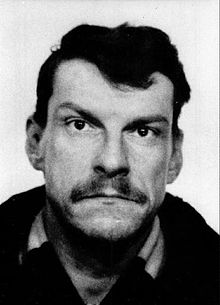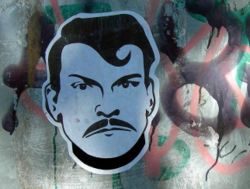- Christer Pettersson
-
Christer Pettersson 
Police photo of Christer PetterssonBorn April 23, 1947
Solna, SwedenDied September 29, 2004 (aged 57)
Solna, SwedenNationality Swedish Christer Pettersson (April 23, 1947 - September 29, 2004) was a Swedish criminal who was a suspect in the 1986 assassination of Olof Palme, the Prime Minister of Sweden. In 1988 he was convicted of the murder in district court but acquitted on appeal the following year.
Contents
Biography
Childhood and early life
Pettersson grew up in a middle class family in Solna outside of Stockholm and later moved to the suburb Sollentuna. In his youth he attended a theatrical school (Calle Flygares teaterskola) where he was considered very promising by at least one of his teachers.[1] However, Pettersson suffered a head injury that he would never fully recover from. Subsequent to his injury, Petterson began a period of substance abuse which would eventually force him to drop out of school.
In 1970, he killed a man in a street of Stockholm, seemingly without any provocation, in what the Swedish press dubbed the "bayonet murder".[citation needed] Pettersson was sentenced to prison for manslaughter for the killing.[citation needed] After his release he continued a life of petty crime, which financed his alcohol and drug abuse.
Tried for the murder of Olof Palme
On the night of February 28, 1986, the Swedish Social Democratic Prime Minister Olof Palme was shot and killed in Stockholm as he walked home from a cinema with his wife, Lisbet Palme. Pettersson was accused of Palme's murder after an extensive investigation by the Swedish police. He was picked out from a police lineup by Mrs Palme. The original tip-off leading to the incrimination of Pettersson has been described by some as very dubious. Although the .357-caliber Magnum pistol used to kill Palme was never found, Pettersson was convicted and sentenced to life imprisonment in 1988.
However, in 1989 he was freed after an appeal court cited lack of evidence, including the missing murder weapon. It also questioned the reliability of Mrs Palme's identification. Pettersson was awarded about $50,000 in compensation for defamation by the police and for wrongful imprisonment. He quickly spent the money on alcohol and drugs, but was able to augment his income through selling TV and newspaper interviews. In some of those interviews – particularly on TV3 – Pettersson admitted to killing Olof Palme, but his confession was not treated seriously. On several occasions Pettersson pointed out that he himself was a "Social Democrat", and liked Olof Palme.
In 1998, the Supreme Court rejected a prosecutor's appeal to retry Pettersson citing that evidence was not strong enough to place him at the scene of the shooting.
Coma and death
On September 29, 2004 Pettersson died at the Karolinska University Hospital after he supposedly fell and suffered a cerebral haemorrhage. He had been in a coma since September 16, 2004 when he underwent emergency surgery for unspecified head injuries. Pettersson had reported being harassed by the police on September 15, the day before he was found with head injuries, with unsubstantiated rumors circulating that he was a victim of police violence. Pettersson was buried in his hometown Sollentuna in January 2005.
Shortly before Pettersson was taken to hospital, he had contacted the son of Olof Palme, Mårten Palme, explaining he had something to tell the family. Palme said he was willing to meet Pettersson if he was ready to confess to the murder. But the meeting did not take place, and what Pettersson had to tell was never revealed.
According to a documentary aired on the Swedish television channel SVT in February 2006, associates of Pettersson claimed that he had confessed to them his role in Olof Palme's murder, but with the explanation that it was a case of mistaken identity. Apparently, Pettersson had intended to kill a drug dealer, dressed in similar clothing, who often walked along the same street at night. The show also suggested that there was greater police awareness than previously acknowledged due to surveillance of drug activity in the area. The police had several officers in apartments and cars along those few blocks of Sveavägen but, 45 minutes before the murder, the police monitoring ceased.[2] In the light of these revelations, Swedish police undertook reviewing the Palme case and Pettersson's role. However, in an op-ed in the newspaper Dagens Nyheter on February 28, 2006, two senior SVT reporters criticised the TV documentary severely, claiming that the filmmaker had fabricated a number of statements while omitting other contradictory evidence.[3]
Cult figure
Both before and after his death, Christer Pettersson had achieved a certain notoriety as a cult figure, being portrayed as a victim of society and as a scapegoat in the media. At the same time he was seen as an outlaw and a rebel, and appeared as an icon in some subcultures, including music and art.
References
Literature
- John Douglas-Gray in his thriller 'The Novak Legacy' ISBN 978--0-7552-1321-4
External links
Categories:- 1947 births
- 2004 deaths
- 20th-century criminals
- Deaths from cerebral hemorrhage
- Overturned convictions
- People convicted of manslaughter
- People acquitted of murder
- People convicted of murder by Sweden
- People from Stockholm
- Prisoners sentenced to life imprisonment by Sweden
- Swedish assassins
- Swedish people convicted of murder
- Swedish prisoners sentenced to life imprisonment
Wikimedia Foundation. 2010.

